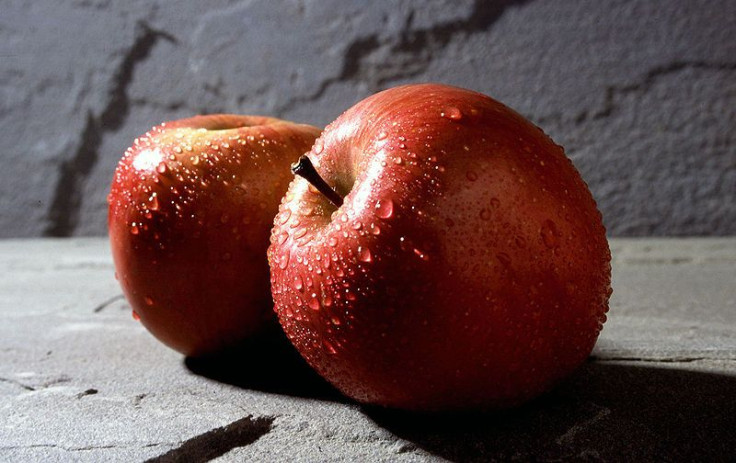Apples Altered By Global Warming: Could Climate Change Make Them Permanently Lose Their Taste And Crunch?

The loud crunch that accompanies the bite of a tart apple’s flesh may soon no longer be part of the apple eating experience. Apples are the second-most valuable fruit grown in the United States (oranges are first) and the average American consumer eats approximately 19 pounds of fresh apples each year, says Vermontapples.org. Its convenience and durability makes this fruit a popular staple in the American diet because it can be processed into sauce, slices, juice, and flavored desserts.
But the classic taste of apples is starting to change. Fuji and Tsugaru apples, ranked as the two most consumed kinds of apples in the world, have lost their texture and taste throughout the years due to the effects of global warming on agriculture. A study published in the journal Scientific Reports found that, due to climate change, apples are taking on on a new chemical composition that can alter the way the fruit is consumed.
Researchers from Japan assessed the impact of global warming on the taste and texture of Fuji and Tsugaru apples by analyzing a compilation of data gathered from 1970 to 2010. The effects of climate change are difficult to identify in agriculture statistics because of non-climatic factors that can directly impact the composition of fruits. The orchards used in the study were chosen specifically because there were no changes in cultivars or management practices in them — making them a control group and eliminating technological advances as a possible reason for the change in texture and taste in apples, reports Dawn.com.
The farms used in the study are located in the Nagano and Aomori regions in Japan, where the temperature increased approximately 0.5 and 0.6 degrees per decade, in each region, wrote the researchers. During the 40-year period, apple cultivation was significantly impacted by growing time and air temperature but not by precipitation, sunshine duration, or solar radiation.
Japanese scientists chemically compared present-day Fujis with tests previously conducted on samples from the very same orchard in the 1970s to account for any differences in the taste and texture of these apples. The consensus of the study was today’s Fuji apple is not as crunchy and tart as it was during the 1970s because of warm climatic changes in the region where this orchard can be found.
“All such changes may have resulted from earlier blooming and higher temperatures” during apple season, said the researchers of the study.
Fuji Apples’ Early Bloom
Scientists have attributed the change in Fuji apples change due to earlier and earlier blooming time, caused by global warming. According to findings published in the journal of Agricultural and Forest Meteorology, the flowering date of apple cultivation has accelerated by 2.2 days every decade in Germany. Blooming time is influenced by temperature and rainfall throughout the seasons.
Less Crunchy And Sweeter Apples
Over the period of 40 years, Fuji apples have become less crunchy and sweeter, but how many apple consumers noticed the difference?
Probably not many. Instead of selling consumers the changed apples, orchards are now being moved more northward as global warming is causing many in the agriculture business to adapt to new weather patterns. For example, there is speculation that the Tokohu region, where the Fuji apple was first cultivated, will be unfit for apple harvesting by 2060.
The extensive evidence of the effects of global warming on food cultivation calls for a reevaluation of how to cultivate crops that can sustain the climate change. Farmers will now have to develop new strategies that take into account warmer temperatures during harvesting.



























